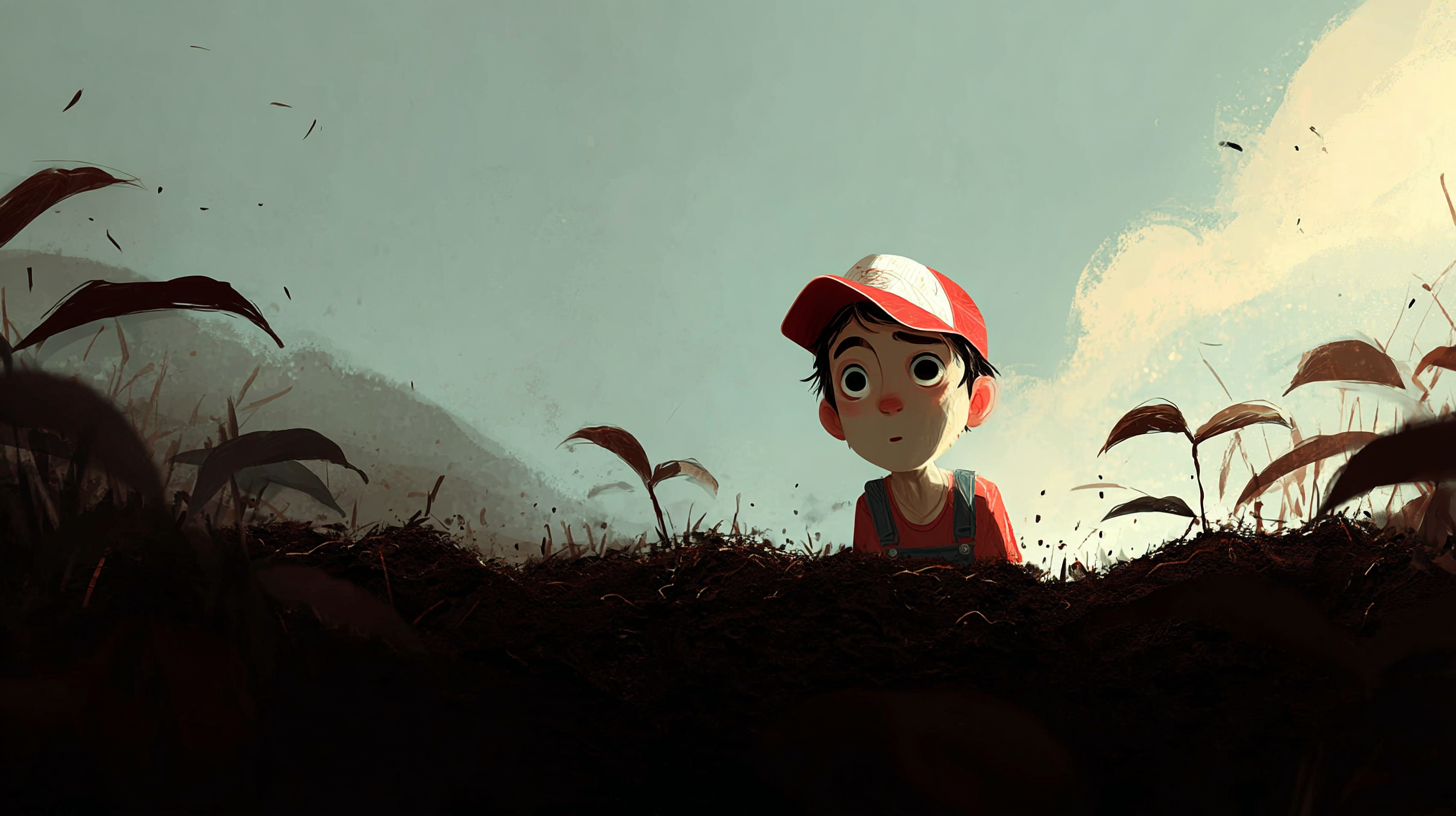Soil means “earth” or “to make something dirty.”
soilは「土」や「よごす」という意味の言葉です。
以下は英単語 “soil” に関するストーリー型学習コンテンツです。まずは大枠の意味を理解して最後の文章で確認しましょう。
主な意味(main meaning)
| 品詞 | 意味 | 発音記号 | 例文 |
|---|---|---|---|
| 名詞 | 土、地面、土地 | /sɔɪl/ | Farmers grow crops in rich soil. |
| 動詞 | (汚す、よごす) | /sɔɪl/ | He accidentally soiled his shirt with coffee. |
語源(etymology)
語源:中英語 soil(土地、地面)、古フランス語 soill から。
イメージ:「地面にある土」「触ると汚れるもの」。
類義語(synonyms)
| 類義語 | 意味 | 例文 |
|---|---|---|
| earth | 地球、土 | The earth is covered with soil and plants. |
| ground | 地面 | She sat on the ground and looked at the sky. |
| dirt | 汚れ、土 | His shoes were covered with dirt after hiking. |
| land | 土地、地面 | They bought a piece of land to build a house. |
反義語(antonyms)
| 反義語 | 意味 | 例文 |
|---|---|---|
| sky | 空 | Birds are flying in the sky above the soil. |
| clean | 清潔な | Please keep your clothes clean and do not soil them. |
コロケーション(collocations)
| コロケーション | 例文 |
|---|---|
| fertile soil | This region has fertile soil for growing rice. |
| soil erosion | Heavy rain can cause soil erosion. |
| soil quality | Farmers test the soil quality every year. |
| rich soil | Flowers grow well in rich soil. |
2項表現(binomials)
| 2項表現 | 例文 |
|---|---|
| soil and water | Plants need soil and water to grow. |
| land and soil | The farmer takes care of the land and soil every season. |
英語ストーリー(english story)
The Farmer’s New Idea
Tom was a young farmer who had just started working on his family’s land. His father had farmed for many years, but Tom wanted to try some new ideas. One morning, Tom walked across the field and looked at the soil. It was dark and rich, which made him happy. “With this kind of soil, I can grow almost anything,” he thought.
However, Tom also remembered that last year there had been heavy rain, and the water had washed away some of the top soil. This problem is called soil erosion. If it continued, the farm would lose its best earth. Tom decided to find a way to stop it.
At lunch, Tom talked to his father.
“Dad, I think we need to protect our land and soil. If we don’t, the crops won’t grow well in the future.”
His father looked surprised but agreed. “That is true. But what can we do?”
Tom explained that he had read about planting grass around the fields. The roots of the grass would help hold the soil and water in place. His father nodded. “That sounds like a good idea.”
The next week, Tom and his father tested the soil quality. They found that some areas were excellent, but other parts were weaker. Tom said, “If we take care of this, our farm will become even stronger.” His father smiled. “You are thinking like a real farmer.”
One day, Tom’s younger sister Anna came to the field. She saw Tom working and laughed. “Be careful not to soil your clothes with dirt!” she said. Tom looked down at his muddy shirt and laughed too. “Well, farmers always get dirty. That is part of the job.”
Later, Tom’s neighbor Mr. Green came by. He said, “Your farm has very fertile soil. You could grow vegetables for the market.” Tom answered, “That’s exactly my plan. With good land and soil, and with some new ideas, we can succeed.”
Tom thought about other words he had learned. Earth, ground, dirt, and land all had similar meanings, but “soil” felt special to him. Soil was not just the ground—it was life. Without it, plants could not grow, and people could not live. He also remembered the opposite words: the sky above and the need to keep things clean even when working with soil.
By the end of the season, the farm was doing better than ever. The crops were healthy, and the land looked strong. Tom’s father said proudly, “Your ideas saved our soil. You have shown me that tradition and new thinking can work together.”
Tom felt proud too. He knew that taking care of the soil was the key to the future.
和訳
農夫の新しいアイデア
トムは若い農夫で、家族の土地(land)で働き始めたばかりでした。父親は長年農業をしていましたが、トムは新しいアイデアを試したいと思っていました。ある朝、トムは畑を歩きながら**土(soil)**を見ました。それは黒くて栄養があり、トムはうれしくなりました。「こんな土なら、ほとんど何でも育てられる」と思いました。
しかしトムは、去年大雨が降って**土壌浸食(soil erosion)**が起こり、表土が流されたことを思い出しました。このままでは畑の良い部分を失ってしまいます。トムはそれを防ぐ方法を見つけようと決心しました。
昼食のとき、トムは父親に言いました。
「お父さん、土地(land and soil)を守る必要があると思います。そうしないと、将来作物が育たなくなります。」
父は驚きましたが、うなずきました。「その通りだ。でもどうすればいい?」
トムは、畑の周りに草を植えるとよいと説明しました。草の根が土と水(soil and water)をしっかりつなぎ止めてくれるからです。父は「それはいい考えだ」と答えました。
次の週、トムと父は**土壌の質(soil quality)**を調べました。良い場所もありましたが、弱い場所もありました。トムは言いました。「これを大事にすれば、畑はもっと強くなります。」父は笑って「お前は本物の農夫の考え方をしているな」と答えました。
ある日、妹のアンナが畑に来ました。彼女はトムを見て笑いながら言いました。「服を汚さないように(soil your clothes)気をつけて!」トムは泥だらけのシャツを見て一緒に笑いました。「まあ、農夫はいつも汚れるんだ。それも仕事の一部さ。」
その後、隣人のグリーンさんがやってきて言いました。「この畑にはとても**肥えた土(fertile soil)**があるね。市場に野菜を売れるんじゃないか。」
トムは答えました。「まさにそれが僕の計画です。良い土地と土(land and soil)、そして新しいアイデアがあれば成功できます。」
トムはearth(地球、土)、ground(地面)、dirt(汚れ、土)、**land(土地)という似た言葉を思い出しましたが、“soil”は特別な感じがしました。soilはただの地面ではなく「命」でした。土がなければ植物も育たず、人も生きられません。反対にsky(空)があり、農作業でも物をclean(清潔に)**保つ必要があることも思い出しました。
季節の終わりには、畑はこれまで以上に元気でした。作物は健康で、土地は力強く見えました。父は誇らしげに言いました。「お前のアイデアが土を守ったんだ。伝統と新しい考え方は一緒にやっていけるものだな。」
トムも誇らしく感じました。彼は、土を大事にすることが未来の鍵だと知っていたのです。
Q&A
Q: soil と earth の違いは?
A: soil は主に植物が育つ「土」を意味します。一方 earth は「地球」全体や「地面」という大きなスケールを指すことが多いです。
Q: soil と ground の違いは?
A: soil は「栄養のある土壌」を強調しますが、ground は「地面」や「足元の表面」を意味します。たとえば「立つ場所」は ground、「作物を育てる土」は soil と使い分けます。
Q: soil と dirt の違いは?
A: soil は農業や植物に必要な「土」で、価値があるものとして扱われます。dirt は「汚れた土」や「泥」を表し、ネガティブな響きがあります。
Q: soil と land の違いは?
A: soil は「土そのもの」を指し、物質的です。land は「土地」「領地」など、広がりや所有を意識した言葉です。農地や国の土地は land、作物を育てる土は soil と言います。
Q: soil quality と fertile soil の違いは?
A: soil quality は「土の質・状態」を広く指し、よい場合も悪い場合も含みます。fertile soil は「栄養が豊かで作物がよく育つ土」という限定的でポジティブな意味です。
Q: soil erosion と普通の erosion の違いは?
A: erosion は「侵食」という一般的な現象を意味します。soil erosion は特に「雨や風で土が流されること」に限定されています。
Q: soil と clean の関係は?
A: soil は動詞で「汚す」という意味を持ちます。clean は「きれいにする・清潔な」という意味なので、対になる関係です。
Q: soil と sky の違いは?
A: soil は「地面や土」、sky は「空」。真逆の場所を指すため、対比的に使われることが多いです。
このように見ると、soil は「植物を育てるための土」を中心に、文脈で「よごす」という意味にもなる特別な単語ですね。



コメント